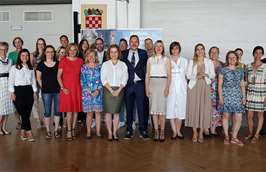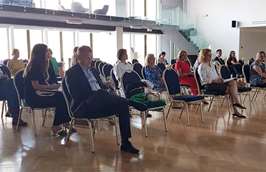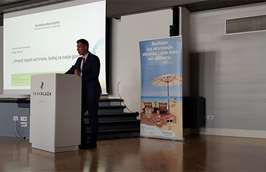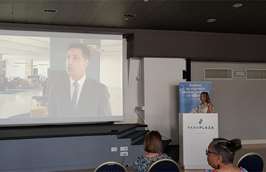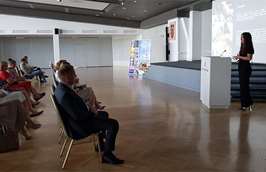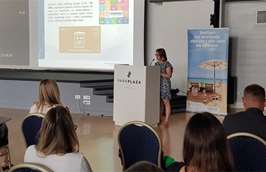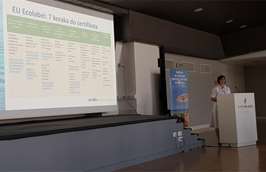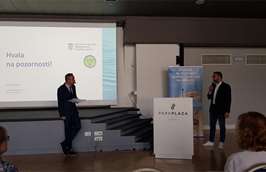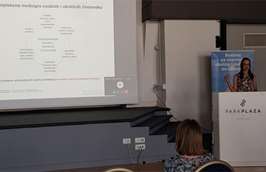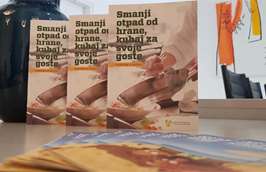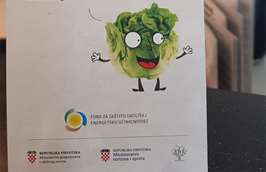07.07.2022.
The event to mark the conclusion of the Fund’s pilot project “Reduce food waste, cook for your guests” was held at the Park Plaza Histria Hotel in Pula. The results of the project were presented, as well as the guide for hotels as a valuable tool for reducing the quantity of food waste.The pilot project was launched last year by the Environmental Protection and Energy Efficiency Fund in collaboration with the Ministry of Economy and Sustainable Development and the Ministry of Tourism and Sports. The main goal of the project was to implement work methods in hotel kitchens that would reduce biowaste, i.e. food waste. The pilot started in two Croatian hotels – in Pula and in Osijek, and later on the spa hotel Terme Sveti Martin na Muri joined the project. The methods implemented by the hotels resulted in significant savings.
“Now the project has ended and we’re presenting its results, what we actually want is to ensure that the activities aimed at reducing biowaste (food waste) will continue in many other hotels in Croatia, and over time in other institutions with large kitchens and potential for getting results from these tested methods. Hotels around the world which implemented strategies to prevent food waste managed to reduce its quantities and the negative impact on the environment, and achieved significant financial savings. We can do the same at other hotels,” said Maja Feketić, the head of the Sector for EU Funds at EPEEF.
The head of the Department for the implementation of EU projects and pilot project coordinator Vesna Cetin Krnjević explained that more and more guests were looking for green hotels. She presented the results of the pilot project that were based on the measurements and recommendations for hotel staff, and advice on how to motivate guests so that they too could contribute to reducing food waste. Another result of the project aimed at preventing throwing leftover food are leaflets and messages for guests promoting the habit of taking only as much as one will eat, at the same time not preventing them from enjoying assorted hotel menu. “Workshops for hotel staff were conducted at the Park Plaza Histria, food waste quantities were measured, and methods were proposed that allowed reducing food waste by as much as 20%,” pointed out Cetin Krnjević from the Fund.
The Park Plaza Histria Hotel manager Tomislav Korošec said it was a pleasure to participate in the project and was delighted by the results they achieved. “It was an honour to be part of this pilot project of the Environmental Protection and Energy Efficiency Fund as the first green hotel on the Adriatic trying to reduce food waste. The Arena Hospitality Group has always supported and will continue to support advanced and modern developments in new technologies, as well as projects related to environmental and social corporate responsibility in the hotel industry, and the programmes already implemented by many hotel chains around the world.”
Aljoša Duplić, the director of the Institute for Environment and Nature at the Ministry of Economy and Sustainable Development said that tourism and high numbers of visitors were leaving a significant waste footprint, part of which comprises food waste. “By reducing food waste, we could achieve great results and we would have significant reductions in municipal waste”, concluded Duplić.
The new trends in tourism present the opportunity for qualitative transformation of the Croatian accommodation capacities to preserve the environment, attracting more demanding tourists, and extending the tourist season in Croatia. This is supported by ecological certificates that were presented by the head of the sector at the Ministry of Tourism and Sports Jelena Šobat, who explained that the National Recovery and Resilience Plan allocated part of the funding for eco certificates/EU Ecolabel, EMAS, ISO, and equivalent. She also mentioned the criteria to be met to obtain the eco certificate, underlining the importance of implementing sustainable tourism activities.
Trends and habits in food consumption are subject to change, especially in today’s challenging times – from unpredictable situations to numerous innovations that make the future very uncertain to say the least. It is very important to modify people’s habits regarding food consumption because excessive amounts of food are unnecessarily thrown away. “People’s habits, even those related to discarding food, are a complex intertwined play of personal and environmental factors. So, for example, it was shown that the activities for reducing food waste can have an adverse impact on the current obesity issue, because in order to prevent throwing away food, we quite often tend to overeat. And vice versa – when we try to eat healthier, we stuff our fridges with fresh easily perishable food that again gets thrown in the bin. We have to strike a balance here. I’m glad to see that the hotels included in this project considered this,” said Iva Dorić, MS Nutrition, from the Croatian Agency for Agriculture and Food.
The results of this pilot project clearly show the need for further activities to reduce food waste. Support for the pilot was reaffirmed by the director of the directorate at the Ministry of Tourism and Sports Slavko Štefičar, the head of the department at the Ministry of Economy and Sustainable Development Đurđica Požgaj, and the director of the Association of Employers in Croatian Hospitality Industry and other representatives of hotels in Croatia.







